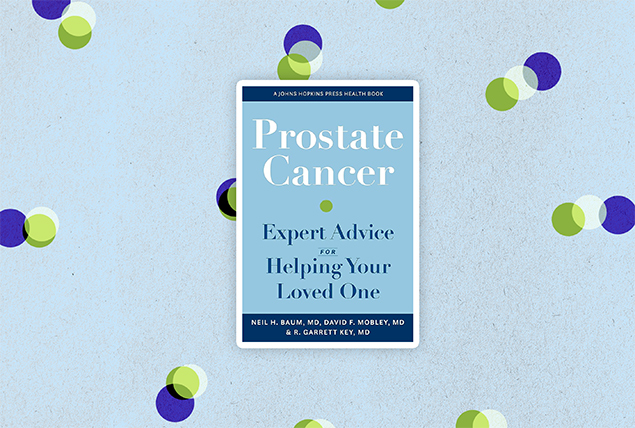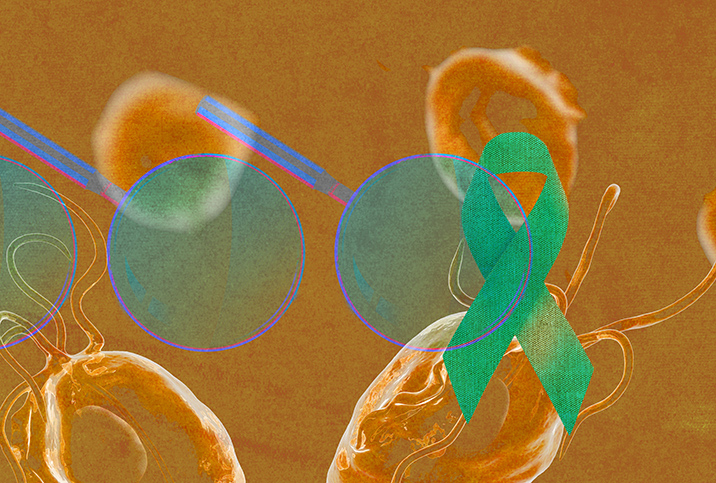Between the Pages: 'Helping Your Loved One' With Prostate Cancer

Key Points
- Partners can be left out and unacknowledged, especially when it comes to relaying medical information. A lot can get lost in that translation from the doctor to the partner.
- Many men are concerned about the side effects they may encounter when treated for prostate cancer, particularly the problem of sexual dysfunction or impotence.
Prostate cancer is the second deadliest cancer for men, and it affects more than 280,000 men in the United States every year.
Many go through the journey of prostate cancer—from diagnosis to treatment and beyond—with a partner by their side. However, there aren't many books available that specifically address the loved ones who want to help and care for these men.
Neil Baum, M.D., a urologist based in New Orleans, Louisiana, provides a new resource for people with prostate cancer as well as their partners in his book, "Prostate Cancer: Expert Advice for Helping Your Loved One," published by Johns Hopkins Press. A professor of clinical urology at Tulane Medical School and the author of 17 books, Baum has treated thousands of men with prostate cancer.
In this exclusive interview, Baum discusses navigating the challenges of caring for men with prostate cancer, the physical and psychological effects of the disease, and more.
Editor’s Note: This interview has been edited for length and clarity.
Tell us about your background in urology and why you decided to write 'Prostate Cancer: Expert Advice for Helping Your Loved One.'
I have focused my practice on prostate cancer and other related prostate conditions, such as benign enlargement of the prostate gland, prostate infections, urinary tract infections and erectile dysfunction.
My wife had breast cancer, and when I was accompanying her to her doctor. [When] I was in the reception area there was a book about breast cancer for men and I thought that being a physician I knew a lot about breast cancer. I opened the book and I saw several topics—such as the BRCA gene and estrogen receptor-positive breast cancer—I had no idea about.
I wondered if there was a book like this for partners of men with prostate cancer. I went to the internet and did research and there was nothing available.
Two years ago, I wrote a book proposal and sent it to Johns Hopkins Press. I got a co-author, urologist David F. Mobley, M.D., and a psychiatrist, R. Garrett Key, M.D., who addressed the mental health issues men face who have prostate cancer and their partners. The proposal was accepted and it took a year to write the book.
I’m hoping to reach large numbers of partners to educate and inform them about what’s available. So many times, partners are left out, they don’t get acknowledged, and the person with the disease comes home and tries to explain what the doctor said.
A lot gets lost in that translation from the doctor to the partner, which is why I thought this book would be helpful.
Recommended
- Prostate Cancer—Know Your Risk Factors: Understanding the key components that drive the disease can help you make the most informed screening choices.
- Recognizing the Signs of Prostate Cancer: It's often difficult to see this disease coming. Find out why—and what you should watch for.
- How Does Prostate Cancer Treatment Affect Sex for Partners: Sexual dysfunction is common among survivors. Its effects impact significant others, too. Find out more.
What general guidance do you have for a partner navigating the challenges that come with caring for and supporting their partner?
The diagnosis of prostate cancer impacts not the man and his partner, physically, mentally and emotionally.
Men treated for prostate cancer commonly experience erectile dysfunction. They can have incontinence or loss of urine. Consequently, the partners have to be sensitive to what a man is going through.
The psychological impacts a man and the partner as well. The diagnosis and the treatment can lead to anxiety and depression, it can make a man feel less of a man, and cause a loss of self-confidence and the concept of his masculinity.
Yes, this is a problem that affects the man, but it affects the partner as well.
I think if the partner receives education and is involved in communication with the man with prostate cancer, and is sensitive and participates in the treatment of the condition, the couple does well. If the partner notices they're a little depressed and is pulling back—for example, he’s not comfortable in intimacy of any kind, including just kissing and hugging—that’s a time for early intervention.
This is not done by the urologist or the primary care doctor. You really need to see someone who has experience in treating the emotional aspects of sexuality, such as a counselor or a therapist. If depression is significant, they probably need an anti-anxiety or antidepressant medication and to see a psychiatrist.
Many with prostate cancer take a watchful waiting/active surveillance approach. What does this entail? In what scenarios would this be a route to consider?
Some men are very concerned about the side effects they may encounter when treated for prostate cancer, particularly the problem of sexual dysfunction or impotence. Consequently, they may wish to defer treatment.
If the man has no symptoms and he’s an older man—let’s say he’s 70 and might have less than 10 years of life expectancy—he may defer treatment and accept a program of active surveillance. This consists of regularly monitoring the PSA [prostate specific antigen] and if necessary, having a prostate biopsy.
If there is evidence of escalation of the disease or he becomes symptomatic, or if there is evidence of disease progression, then the active surveillance can be converted to active treatment.
Let me give you an example: A man 75 years of age is diagnosed with prostate cancer, and has diabetes, and heart disease and he's overweight or has a problem with obesity. He probably has less than 10 years of life expectancy, and he may not wish to undergo surgery or radiation or chemotherapy.
This would be a situation where a good appropriate discussion between the patient and his doctor would take place to make sure the patient understood the risks associated with watchful waiting or active surveillance. In that situation, it may be appropriate for non-treating and for close follow-up.
What are some of the potential sexual side effects of prostate cancer and its treatments?
Physical side effects after prostate gland surgery include a decrease in the penile length, especially after the removal of the prostate gland.
This is why I recommend that men, shortly after surgery, within weeks, begin taking some of the drugs available for enhancing erections, such as Viagra [sildenafil] or Cialis [tadalafil]—these drugs are very effective. I don’t feel one has significant value or improvement over the other. However, Cialis does have a longer half-life than Viagra.
The main contraindication to using those drugs is the use of nitroglycerin. If the man has chest pain or angina, and routinely uses nitroglycerin, this is a contraindication to receiving a prescription for Viagra or Cialis. But I recommend that within weeks after surgery, men begin taking a low dose of one of these drugs as it's known to increase the blood supply to the penis and promote what I call 'penile rehabilitation.'
Most men have a loss of penile length after surgery. These men should be reassured that with the passage of time, the length will return, especially if using these drugs.
There’s also a device called the vacuum erection device, which creates an artificial erection by enhancing the blood supply to the penis.
Another condition that is not well-known, but can be extraordinarily frightening, is climacturia, known as orgasm-associated incontinence. This is a condition after surgery where the muscle that shuts off the bladder is weakened, and when a man with no prostate has an ejaculation, urine can come out of the bladder instead. It’s embarrassing to him and his partner.
There is a simple solution, though: Go to the restroom before engaging in sexual intimacy.
For the psychological problems associated with prostate cancer, I recommend an early discussion and bringing up the issues of erectile dysfunction or incontinence with the doctor, and having both partners involved in this discussion.
If someone is experiencing significant emotional problems, then early counseling or sex therapy with a certified counselor is appropriate.


















